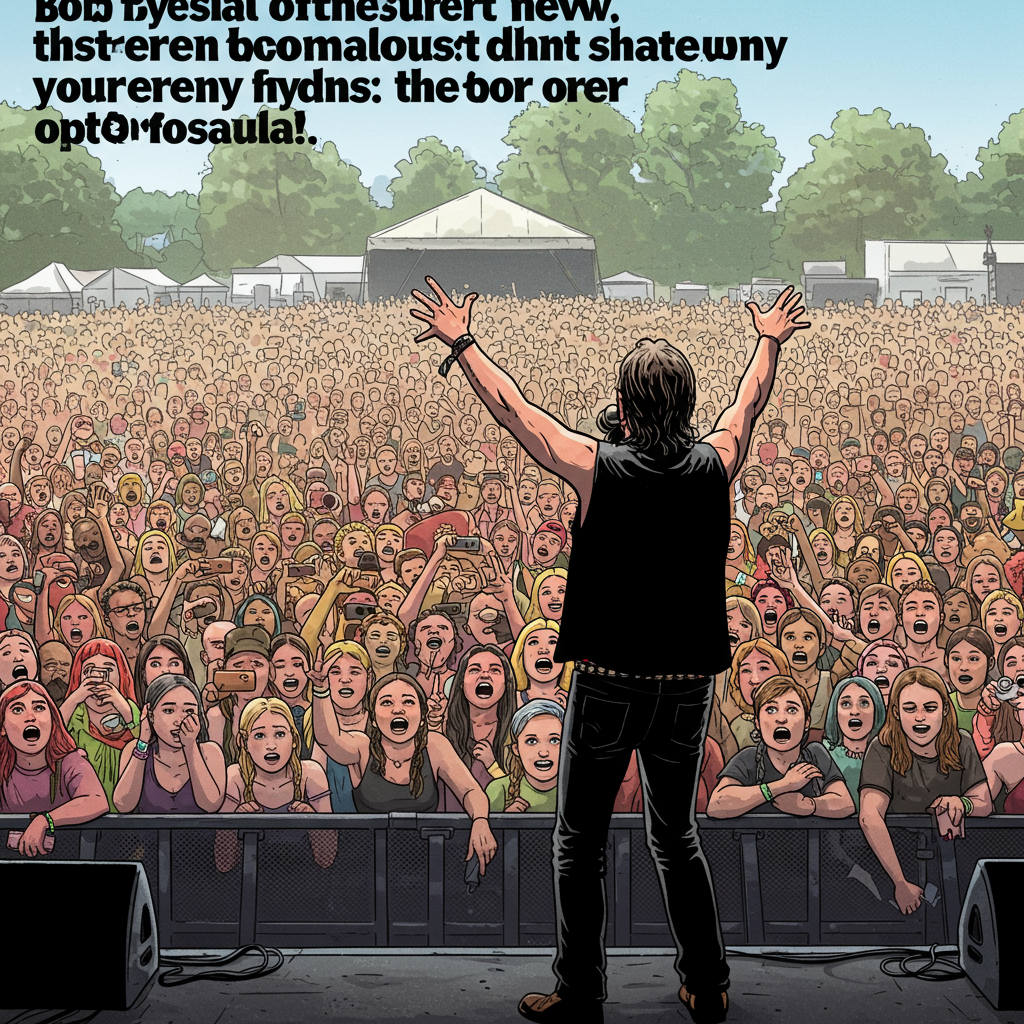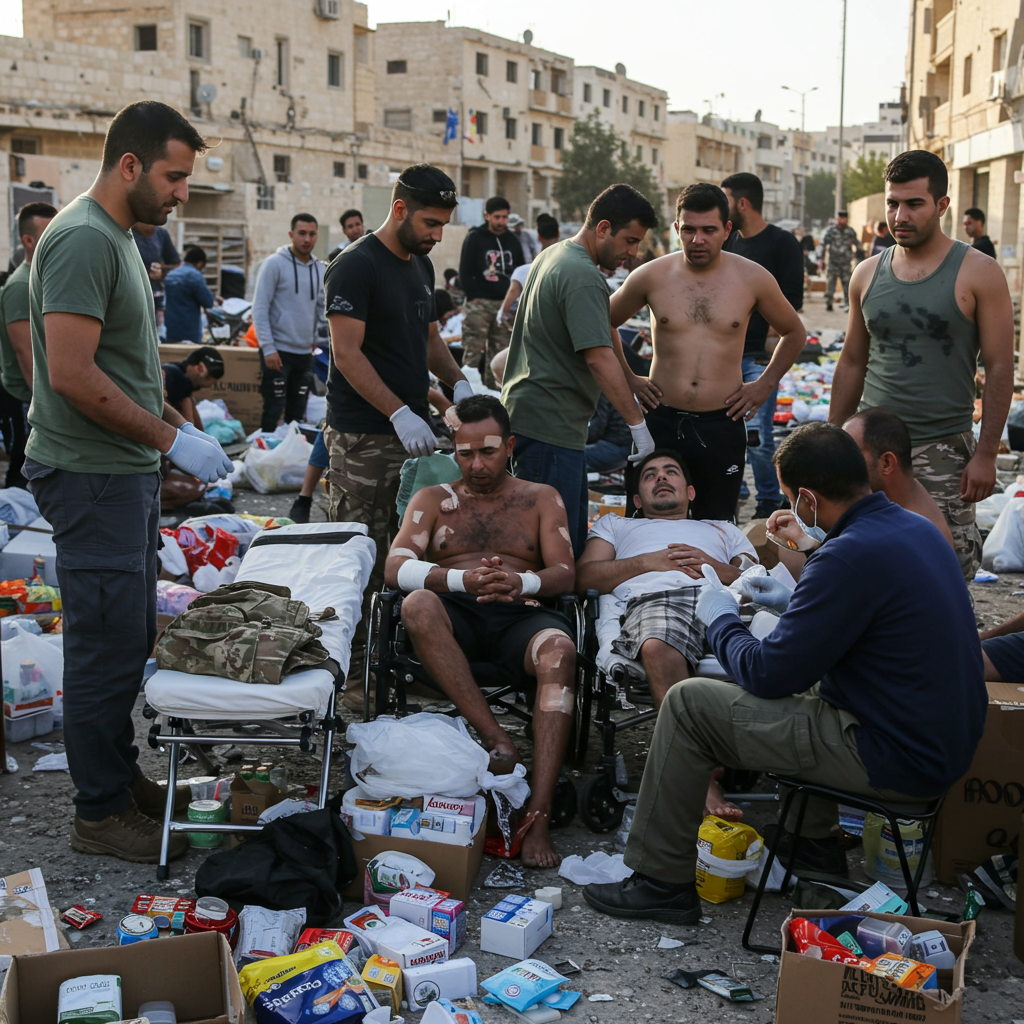A controversial performance by punk-rap duo Bob Vylan at glastonbury Festival has ignited significant debate and official backlash. During their set, the group led the crowd in chants referencing the israeli Defence Forces (IDF), sparking accusations of hate speech and triggering a police investigation. This incident has brought renewed attention to both the band’s confrontational style and the complex, often contentious history and actions of Israel’s military. Understanding the context of this uproar requires looking at the specific events at Glastonbury and delving into the background and controversies surrounding the IDF itself.
The Glastonbury Incident and Immediate Fallout
The focal point of the controversy was Bob Vylan’s performance on the West Holts stage at Glastonbury. Mid-set, the duo engaged the audience, leading them in chants that included “Free, free Palestine” and, most notably, “Death, death to the IDF.” Reports also indicate the use of the slogan “From the river to the sea, Palestine must be, will be, inshallah, it will be free” and a comment about working for a “f*ing Zionist.”
The BBC live-streamed the performance, a decision they later expressed regret over, calling the chants “deeply offensive” and “utterly unacceptable.” While an on-screen warning about “very strong and discriminatory language” was displayed during the broadcast, the BBC admitted with hindsight they “should have pulled the stream.” The performance is not being made available on demand.
The reaction from festival organizers and political figures was swift and critical. Glastonbury co-organizer Emily Eavis stated the festival was “appalled” by the remarks, asserting they “very much crossed a line.” She emphasized that there is “no place at Glastonbury for antisemitism, hate speech or incitement to violence.” British Labour leader Keir Starmer condemned the chants as “appalling hate speech” and questioned how the BBC allowed the broadcast. The Israeli Embassy in the U.K. described the rhetoric as “inflammatory and hateful,” suggesting it normalized extremism. Broadcasting regulator Ofcom also expressed being “very concerned.”
Avon and Somerset Police confirmed they are reviewing video evidence to assess if any criminal offenses were committed during the performance. The incident also had professional repercussions for the band; their talent agency, UTA, reportedly dropped Bob Vylan as clients following the controversy, removing their page from the agency’s website.
Bob Vylan’s Response to Criticism
Amidst the firestorm of criticism, Bob Vylan’s singer Bobby Vylan took to social media to address the situation. In an Instagram post, he acknowledged receiving both support and hatred. He appeared to defend the statements made on stage, framing them within the broader context of activism and speaking up for change. Comparing it to teaching children to express opinions, even about something like school dinners, he emphasized the importance of advocating for what one believes is right. He encouraged supporters to continue marching, campaigning, organizing online, and using any platform available to “shout about it.”
Understanding the IDF
The target of Bob Vylan’s chant, the Israeli Defence Forces (IDF), is the official military of the State of Israel. Founded in 1948, the same year Israel declared independence, the IDF consolidated various Jewish paramilitary groups that had been active in the region, including the Haganah, Irgun, and Stern Gang. These groups were involved in the events of 1948, which Israel terms its “War of Independence.” Palestinians, however, refer to this period as the “Nakba,” or “catastrophe,” marking the displacement of hundreds of thousands from their homes. Soldiers from Britain’s “Palestine regiment,” which fought against the Axis powers in World War II, were also later integrated into the nascent Israeli military.
Today, the IDF is a modern fighting force comprised of ground troops, a navy, and an air force. According to the International Institute for Strategic Studies, it has roughly 169,500 active personnel and a substantial reserve force of around 465,000. Its navy includes submarines and missile boats, while its air force boasts hundreds of aircraft, including advanced F-35 fighter jets.
The stated mission of the IDF, as outlined on its website, is to “defend the State of Israel and its civilians” and to “face terrorist organisations like Hamas, Hezbollah and Islamic Jihad.” Israel cites security concerns, particularly following the Intifadas of the 1980s and early 2000s, as justification for its military operations and posture.
However, the IDF is also widely referred to in many parts of the Middle East as the “Israeli Occupation Forces” or “IOF.” This designation stems from Israel’s ongoing occupation of the West Bank. While Israeli troops and settlements were withdrawn from Gaza in 2006, Israel has maintained a significant land, air, and sea blockade on the strip, which it claims is necessary for security but which critics argue constitutes continued effective control and contributes to a humanitarian crisis.
Mandatory Military Service in Israel
A key component of the IDF’s structure is Israel’s system of mandatory military conscription. With few exceptions, every Israeli citizen over the age of 18 who is Jewish, Druze, or Circassian is required to serve. Men typically serve for 32 months, while women enlist for 24 months. Upon completing their initial service, individuals are assigned to a reserve unit and can be called up for active duty until they reach the age of 40. This broad participation means a significant portion of the Israeli population has direct experience with the military.
Controversies Surrounding the IDF
Despite the IDF’s claim to be the “most moral army in the world,” its actions have faced extensive international criticism and accusations of reckless and disproportionate conduct. These controversies are often at the heart of protests like the one seen at Glastonbury.
Recent incidents during the conflict in Gaza have drawn particular scrutiny. Reports from the Gaza Government Media Office claim over 500 Palestinians have been killed and more than 4,000 injured while waiting for food at aid distribution sites run by organizations like the Gaza Humanitarian Foundation. Israeli newspaper Haaretz reported claims from Israeli soldiers suggesting they were deliberately instructed to shoot at Palestinians at these sites, with one describing an aid distribution area as a “killing field.” Commanders reportedly ordered firing as a method of “communication.” While Israeli Prime Minister Benjamin Netanyahu and Defense Minister Israel Katz dismissed these specific claims as “blood libels,” and the military denied instructing soldiers to deliberately shoot civilians, Israel’s Military Advocate General has reportedly ordered an investigation into potential war crimes regarding these allegations. The military stated it is working to improve its operational response in aid areas.
Other incidents cited as controversial include the deaths of 15 Palestinian Red Crescent Society (PRCS) paramedics and emergency workers near Rafah in March 2024. Initially, the IDF claimed its soldiers opened fire because the convoy approached “suspiciously” at night. However, the military later stated it had mistakenly identified the paramedics as a threat and that the incident was under “thorough investigation.”
In April 2024, a devastating Israeli airstrike killed seven aid workers from World Central Kitchen (WCK) in central Gaza after they delivered food. The IDF claimed officials believed an armed member of Hamas was traveling with the group. An Israeli soldier reportedly told Haaretz that such strikes occur because “every commander sets the rules for himself.” Following the attack, former British Prime Minister Rishi Sunak commented on the high number of aid worker and civilian deaths in Gaza.
These specific incidents occur within the broader context of the immense human toll of the conflict. Gaza’s Health Ministry figures cite tens of thousands of Palestinians killed and injured since October 2023. While Israel states it targets only militants and attributes civilian casualties to Hamas operating among the population, the scale of death and destruction has led to accusations of war crimes by bodies like the U.N. Commission of Inquiry and strong criticism from numerous countries, including a May statement from the UK, France, and Canada calling for Israel to cease “egregious” military actions.
The Broader Debate: Protest, Politics, and Platforms
The Bob Vylan incident at Glastonbury underscores the intense emotional and political charge surrounding the Israel-Palestine conflict globally. The use of phrases like “Death to the IDF” and “From the river to the sea” are particularly contentious. While some view them as legitimate expressions of protest against military actions and occupation, others, including the Israeli Embassy and figures like Keir Starmer, condemn them as incitement, hate speech, or calls for the destruction of Israel and the elimination of Jewish self-determination, particularly when viewed through the lens of accusations of antisemitism.
The controversy also raises questions about the responsibility of platforms like major music festivals and broadcasters like the BBC when hosting artists who express extreme political views. The debate about whether such protests are antisemitic or if the label is sometimes used to silence legitimate criticism remains a significant point of contention worldwide.
Frequently Asked Questions
What specific chants did Bob Vylan lead at Glastonbury?
During their performance at the Glastonbury Festival, Bob Vylan led the audience in several chants and slogans related to the Israel-Palestine conflict. The most widely reported and controversial chant was “Death, death to the IDF” (Israeli Defence Forces). They also included “Free, free Palestine” and the slogan “From the river to the sea, Palestine must be, will be, inshallah, it will be free.”
What is the historical context of the IDF and the controversy surrounding it?
The Israeli Defence Forces (IDF) was formed in 1948 from Jewish paramilitary groups involved in events tied to Israel’s independence and the Palestinian Nakba. Its stated mission is to defend Israel and its civilians. However, it is also referred to as the “Israeli Occupation Forces” due to the ongoing occupation of the West Bank and blockade of Gaza. Controversies stem from accusations of disproportionate force and specific incidents, including reports of soldiers ordered to fire at aid recipients in Gaza and strikes that killed aid workers and paramedics.
What were the immediate consequences for Bob Vylan after the Glastonbury performance?
Following the controversial performance, Bob Vylan faced immediate backlash and consequences. Glastonbury organizers condemned their remarks, calling them hate speech. The BBC, which live-streamed the set, expressed regret and removed the performance from on-demand viewing. Police initiated an investigation into whether any criminal offenses were committed. Additionally, the band was reportedly dropped by their talent agency, UTA.




